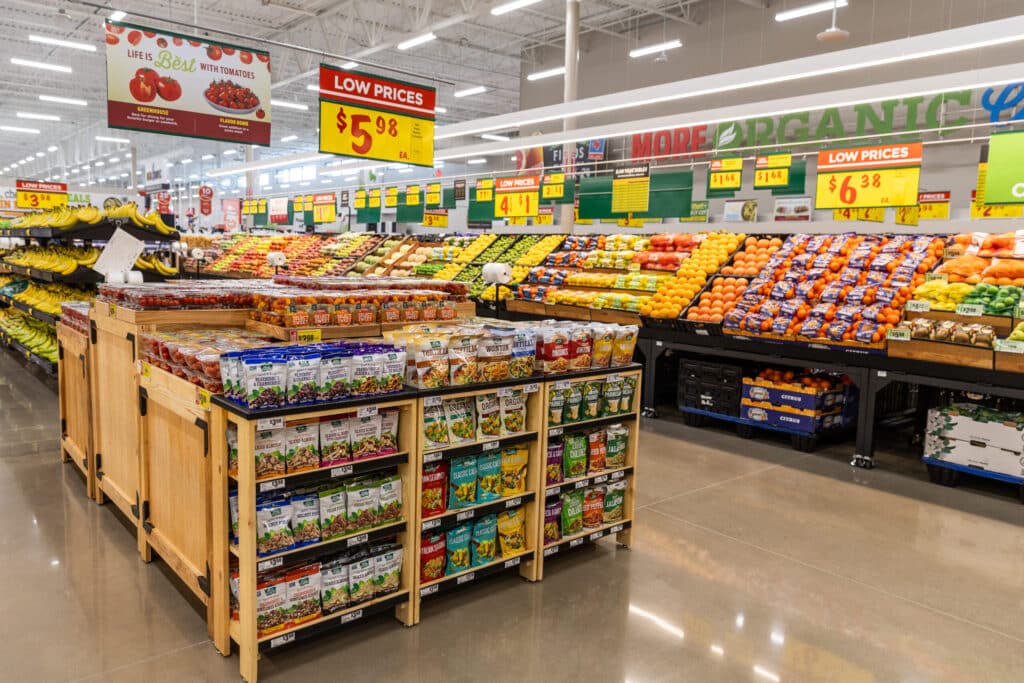
An advocacy group says retailers and manufacturers are “taking advantage of consumers” by maintaining higher prices even as inflation eases. A food industry group, meanwhile, warns against “politicizing grocery prices for political gain.” So who’s right – are higher prices a result of corporate greed, or are those who say so, just playing politics?
As you eye ever-higher prices at the shelf and your ever-increasing grocery budget, the progressive economic advocacy group Groundwork Collaborative has come out with a new report, “What’s Driving the Rise in Grocery Prices – and What the Government Can Do About It.” It acknowledges that many factors leading to higher prices are out of retailers’ and manufacturers’ control – climate, disease, global conflict. But some price hikes are simply the result of “corporate profiteering,” the group alleges.
Citing government statistics, Groundwork points out that prices overall have risen by 19% since the onset of the Covid pandemic, but we’re paying 25% more for groceries. And while the prices of some commodities like eggs and produce have declined from their recent highs, “certain manufacturing and retail corporations have also taken advantage of the recent global inflation surge to raise their profit margins,” the report asserts.
Groundwork quotes several grocery company executives in their own words, saying that price increases have more than offset their higher costs. “Although supply chain issues and increased production costs have played a role in rising grocery prices,” the report reads, many companies have “hiked prices beyond the increase of their input costs to expand their profit margins.”
This is the “greedflation” accusation that many shoppers have leveled against brands and retailers over the past few years. “Skyrocketing grocery prices in America highlight how precarious our supply chains are,” the report said, in acknowledging that some costly problems are out of manufacturers’ hands. But supply chain issues are also “giving corporations ample opportunity to take advantage of consumers,” by using the problems as an excuse to see how high they can raise prices without losing business.
As a progressive organization, Groundwork is largely supportive of Biden administration efforts to help “offset the financial impacts of higher grocery prices on lower-income families,” while many conservative groups argue that Biden administration policies are the reason inflation has been a problem to begin with. The food retailing association FMI is trying to step in as a more neutral arbiter.
“Politicizing grocery prices for political gain is completely counterproductive to improving the accessibility and quality of food for all Americans,” FMI President and CEO Leslie G. Sarasin said in a statement. Many factors that impact costs are indeed out of companies’ control, she went on. And while prices aren’t necessarily coming down, food inflation is slowing. “We welcome and encourage a national discussion about food prices and our food supply chain,” Sarasin concluded, “but such a discussion must be informed by data rather than politics.”
Regardless of the reasons and motives for grocery inflation, Groundwork offers some proposed solutions. Two in particular are unrelated to inflation, per se, but the group says they could help bring prices down – or prevent them from getting any higher.
The first is “investigating and potentially reforming the use of slotting fees.” These are invisible costs between retailers and manufacturers that Groundwork says are often passed on to shoppers. “The freezer aisle can only hold so many pints of ice cream and the chips aisle can fit only so many bags of chips,” the report notes, so stores sell space on their shelves to brands that are willing to pay for the right to be sold there. It’s a practice that others have called out – back in 2016, the Center for Science in the Public Interest similarly called for greater government scrutiny, arguing that “the food system is rigged against everyone but the big food manufacturers with big marketing budgets. And one way or another the cost is passed along to the consumer.”
Groundwork’s second recommendation is that the government carefully scrutinize “anticompetitive mergers throughout the food supply chain.” It specifically calls out the proposed Kroger-Albertsons combination, which it says “would create a grocery monopoly in many markets,” and “raises the risk of higher grocery prices in several communities.”
So supply chain challenges are only one reason grocery prices have soared in recent years. The other reasons could depend on your politics. But every time you look at your grocery bill, the fact that the simple act of grocery shopping just isn’t the same as it used to be, is one thing we can all agree on.
Image source: H-E-B











They say they raise prices until they lose business. That’s not going to happen because people have to eat. They can raise the price of flour to $5 a pound, but people still have to buy it. Same thing with eggs, milk, and cheese. Some of the more frivolous foods like candy, cookies, chips, frozen pizzas, etc might lose sales, but necessities are always going to be purchased.
Unfortunately, they ceased printing the Sears catalog so we’ll still see panic buying of toilet paper, but something needs to be done about corporate greed.
I would tend to believe Groundwork. Real-life example: Pepperidge Farm Goldfish used to go on sale for $.99 at Kroger affiliated stores prior to ‘inflation’. Now the lowest they go is $1.99. It’s highly doubtful the cost to make them went up 100%. Also, it’s is suspect that, if it was really due to inflation, they would raise it to the reflect to cover the actual increase in cost (maybe it’s $1.37, $1.55, etc.) and not to a conveniently rounded extra dollar. I’ve stopped buying them.